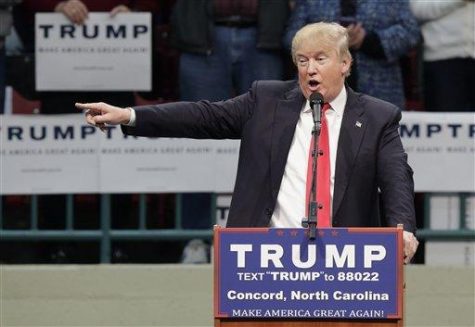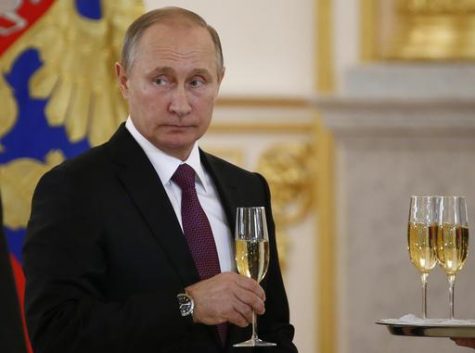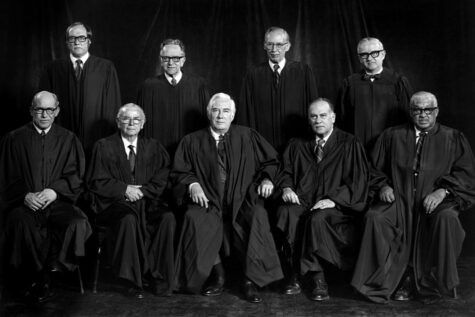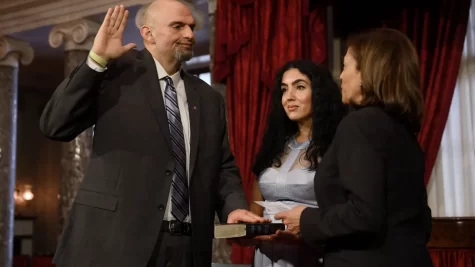Trump Win Transforms Foreign policy
December 8, 2016
Donald Trump’s election day upset sent shockwaves around the globe, and now his foreign policy decisions may do the same.
The implications of Trump’s historic victory on November 8th are now being viewed with scrutiny, especially as the President-Elect’s foreign policy may affect many aspects of people’s lives all around the world. Whether it’s the multi-billion dollar wall to separate the US and Mexico, or the carpet ban on Muslim immigration, Trump’s proposed foreign policy has been controversial. While on the campaign trail, Trump has been criticized for his outlandish claims and campaign promises, but now many wait with baited breath to see if any hold true.
Arguably the most recognizable of Donald Trump’s proposals is his promise to build a wall on the US-Mexico border. It aims to reduce illegal immigration entering the US.

“I will build a great wall,” Trump said during his campaign announcement speech on July 16th, 2015. ”I will build a great, great wall on our southern border. And I will have Mexico pay for that wall.”
Trump’s wall proposal spans around half of the entire US-Mexico border and heights have fluctuated from 25 to 40 feet tall. Trump himself has spoken about how he plans to build the wall out of reinforced concrete panels separated by steel plates over the 1,000 miles, with the Rio Grande fulfilling the remainder of the distance. The Bernstein Research Group estimates that the total cost of building this wall will be anywhere between $15 and $25 billion, more than twice Donald Trump’s own estimates of $12 billion.
The possibility of building this wall has driven a literal divide between the Mexican and American governments, sentiments which are not helped by Trump’s comments on the Mexican people.
On February 25th, 2016, former Mexican president Vicente Fox said, “[Mexico is] not paying for that…wall.” However, both sides have slightly backed off of their stances, with current Mexican president Enrique Peña Nieto commenting on how he would be open to negotiate the establishment of a border wall.
Meanwhile, President-elect Trump has admitted that several large sections of the wall will be made of fence. Despite heated exchanges in the past, it appears that the two nations are making significant strides towards finding common ground.
Another aspect of Donald Trump’s immigration policy is his proposed temporary carpet ban on Muslims entering the United States. Although he has not formally renounced his original plans, The LA Times reports that Trump has evolved this policy to an extreme vetting process. He explained the necessity of this by saying that the majority of potential terrorists come from middle-eastern countries where Islam is the dominant religion, and that protection comes with a price.
Trump’s proposed policy has been heavily criticized by several public officials, as President Obama said, “Calling a threat by a different name does not make it go away.”
Among the moral consequences lie serious legal problems. University of Michigan law professor Richard Friedman called the ban “ridiculous,” saying ,”That’s blatantly unconstitutional if it excludes U.S. citizens because they are Muslims.”
Trump has not commented as to how he would enforce the ban, but a likely theory is that all immigration from what the State Department calls “terrorist havens” would be disallowed. Critics of the ban also point out that this ban would keep refugees out of the United States, possibly endangering the lives of innocent civilians.
The Trump organization has not released any details explaining how long the ban would take place, or how he would be able to identify Muslims from non-Muslims. With little legal backing and enforcement difficulties, this ban won’t likely see the light of day.
Another notable potential foreign policy change within Trump’s administration could be whether the United States remains in the North Atlantic Treaty Organization (NATO). NATO is a military alliance between several countries in North America and Europe, which was founded in 1949. Some of the most prominent events the treaty has been involved in have been the Cold War and the Post-9/11 invasion of Afghanistan.
During his general election campaign, Trump stated that if other members of the treaty do not “pay their bills,” that the US would leave the alliance. International reaction to the statement displayed anger that one of the strongest members of the treaty could soon abandon it.
NATO Secretary-General Jens Stoltenberg stated in an article published after the election that, “We face the greatest challenges to our security in a generation. This is no time to question the value of the partnership between Europe and the United States.”
Along with the uncertainty of the future of NATO, the United State’s relationship with Russia will change significantly after the inauguration of Trump.
Trump has repeatedly advocated to softening the United State’s diplomatic stance on Russia and believes that the US and Russia should be more cooperative on issues such as the Islamic State.
Russia has repeatedly supported Syrian president Bashar Al-Assad, creating yet another divide between the anti-Assad US and Russia. The three nations are currently united in the fight against ISIS, and will be for the foreseeable future.
During one of the Presidential debates, Trump responded to a question regarding foreign policy in regards to Russia and ISIS by stating “I don’t like Assad at all, but Assad is killing ISIS. Russia is killing ISIS and Iran is killing ISIS.”
Trump has been heavily criticized for his supposed relationship with Russia, specifically in regards to Vladimir Putin, Russia’s Prime Minister. A few hours after Trump’s early morning electoral victory, Russian president Vladimir Putin was one of the first world leaders to congratulate him on his victory. Putin also called for collaborative efforts to “remove Russian-American relations from their crisis state.”

Trump reiterated by saying, “If the United States got along with Russia, [it] wouldn’t be so bad.”
Although Trump’s attempt to improve relations with one of the world’s most powerful leaders has been met with some controversy, figures from all ends of the political spectrum have been inflamed by Russia’s supposed role in the presidential election.
On October 7th, 2016, the Obama administration accused Russian intelligence officers of hacking the Democratic National Convention (DNC) and top Hillary Clinton campaign chairman John Podesta. The leaked emails and documents, and the subsequent FBI investigations significantly hindered Clinton’s campaign, indicating a possible link between Trump’s victory and Russian efforts to achieve that goal.
Hillary Clinton has said that if she were elected, she would enter the White House with the most contentious relationship with Russia of any president in the last 30 years. Putin-Clinton relations reached a low in 2011, when Clinton questioned the integrity of the parliamentary election that re-elected Putin. These attitudes posed a perceived threat to the Russian government, threats most experts believe the historically shady government acted upon. The geopolitical relationship between the US and Russia over the following years will be incredibly consequential, so the President-Elect’s stance will have radical implications.
Trump’s many foreign policy proposals have caused both trepidation and celebration internationally, and time will tell if Trump leads with a steady hand, but the long term consequences of this election have yet to be seen.



